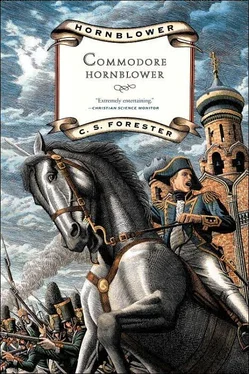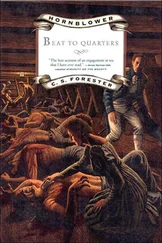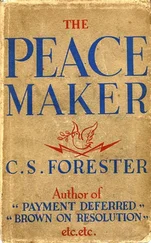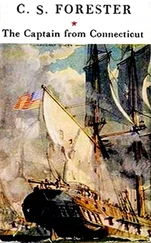“I have no desire to be shot by my own men,” explained Essen. “Sentries will be nervous, and riding into a village that has just suffered a night attack will be as dangerous as storming a battery.”
Hornblower was too preoccupied to appreciate the point very much. His sword and his ribbon and star and his cocked hat added to his usual difficulty of retaining his seat on horseback, and he bumped ungracefully in his saddle, sweating profusely in the cool night, and grabbing spasmodically at items of his equipment whenever he could spare a hand from his reins. They were challenged repeatedly as they rode along, but despite Essen’s gloomy prognostication no jumpy sentry fired at them. Finally they drew up in reply to another challenge at a point where the dome of the church of Daugavgriva stood up black against the pale sky. With the cessation of the noise of the horses’ hoofs a fresh sound claimed Hornblower’s attention; a wailing clamour coloured by high agonized screams; a whole chorus of groans and cries. The sentry passed them through, and they rode forward into the village, and as they did so the groans and screams were explained, for they passed on their left the torch-lit field where the wounded were being treated—Hornblower had a glimpse of a naked writhing body being held down on a table while the surgeons bent over it in the glare of the torches like the familiars of the Inquisition, while the whole field was carpeted with writhing and groaning wounded. And this had been a mere outpost skirmish, a trifling matter of a few hundred casualties on either side.
They dismounted at the door of the church and Essen led the way in, returning the salute of the bearded grenadiers at the door. Candles made a bright pool of light in the midst of the surrounding gloom, and at a table there sat a group of officers drinking tea from a samovar which hissed beside them. They rose as the Governor entered, and Essen made the introductions.
“General Diebitch, Colonel von Clausewitz—Commodore Sir Hornblower.”
Diebitch was a Pole, Clausewitz a German—the Prussian renegade Hornblower had heard about previously, an intellectual soldier who had decided that true patriotism lay in fighting Bonaparte regardless of which side his country nominally assisted. They made their report in French; the enemy had attempted at moonrise to storm the village without preparation, and had been bloodily repulsed. Prisoners had been taken; some had captured an outlying cottage and had been cut off in the counter-attack, and there were other isolated prisoners from various units who had fallen into Russian hands at other points of the perimeter of the village.
“They have already been questioned, sir,” said Diebitch. Hornblower had the feeling that it would be an unpleasant experience to be a prisoner submitted to questioning at the hands of General Diebitch.
“Their statements were useful, sir,” added Clausewitz, producing a sheet of notes. Each prisoner had been asked what was his battalion, how many men there were in it, how many battalions in his regiment, what was his brigade and division and army corps. Clausewitz was in a fair way by now to reconstituting the whole organization of the French part of the attacking army and to estimate its numbers fairly accurately.
“We know already the strength of the Prussian corps,” said Essen, and there was a moment’s awkwardness while everyone avoided meeting Clausewitz’s eye, for he had brought in that information.
“It is only half an hour before dawn, sir,” interposed Diebitch with more tact than could have been expected of a man of his countenance. “Would you care to climb to the dome and see for yourself?”
The sky was brighter still by the time they had climbed the narrow stone stair in the thickness of the wall of the church and emerged into the open gallery that encircled it. The whole of the flat marshy countryside was revealed for their inspection, the ditches and the lakes, and the little Mitau river winding its way down from the far distance, through the village almost under the side of the church, to lose itself at the very angle where the vast Dwina entered the bay. The line of breastworks and abattis thrown up by the garrison to defend the left bank of the Dwina was plainly traced, and beyond them could be seen the scanty works which were all that the invaders had bothered to construct up to the moment. The smoke of a thousand cooking-fires drifted over the country.
“In my opinion, sir,” said Clausewitz deferentially, “if the enemy should decide to proceed by regular siege that is where he will begin. He will trace his first parallel there, between the river and that pinewood and sap forward against the village, establishing his batteries on that neck of land there. After three weeks’ work he could expect to bring his batteries forward on to the glacis and deliver a regular assault. He must effect the reduction of this village before proceeding to the attack on the town.”
“Perhaps,” said Essen.
Hornblower could not imagine a Napoleonic army 60,000 men in full march for St. Petersburg condescending to spend three weeks in siege operations against an outwork without trying first every extemporary method, like the brusque assault of last night. He borrowed a telescope from one of the staff, and devoted his time to examining the maze of waterways and marshes that stretched before him, and then, walking round the dome along the gallery, he turned his attention the view of Riga, with its spires, beyond the huge river. Far off, well down the channel, he could just see the masts of his own squadron, where it swung at anchor at the point where the river blended with the Gulf. Tiny specks of ships, minute in their present surroundings and yet of such vast importance in the history of the world.
Hornblower was asleep in his cabin in the Nonsuch when the alarm was given. Even while he was asleep—or perhaps it may be granted that he woke occasionally without knowing it—his subconscious mind had been taking note of conditions. At least, when he woke fully, he was already vaguely aware of the changes that had occurred during the night. His sleeping, or half-awakened, mind had noted the veering of the wind that had swung Nonsuch round to her anchor, and the brief sharp rain squalls that had pelted down on the deck. Certainly he had awakened to the sharp cry of the watch on deck, and had heard the footsteps overhead of the midshipman of the watch running to him with the news. He was fully awake by the time the midshipman pounded on the door and burst in.
“Rocket from Raven, sir.”
“Very good,” said Hornblower, swinging his legs out of his cot.
Brown, the good servant, was already in the cabin—God only knew how he had picked up the warning—with a lighted lantern to hang on the deck beam above, and he had trousers and coat ready for Hornblower to pull over his nightshirt. Hornblower rushed up to the dark quarter-deck, cannoning into another hurrying figure as he did so.
“Damn your eyes,” said the figure, in Bush’s voice, and then, “I beg your pardon, sir.”
The ship was alive with the twittering of the pipes as the hands were summoned from their hammocks, and the main-deck resounded with the drumming of bare feet. Montgomery, officer of the watch, was at the starboard rail.
“ Raven sent up a rocket, sir, two minutes back. Bearin’ sou’-by-east.”
“Wind’s west-by-north,” decided Bush, looking down into the tiny light of the binnacle.
A westerly wind and a dark blustery night; ideal conditions for Macdonald to try and push a force across the river mouth. He had twenty big river barges, into which he could cram 5,000 men and a few guns; if he once managed to push a force of that size across the river the Russian position would be hopelessly turned. On the other hand, if he were to lose a force of that size—5,000 men killed or drowned or prisoners—it would be a staggering blow which might well give him pause and so gain time for the Russians. A fortified position, in the final analysis, was only a means of gaining time. Hornblower hoped most passionately that the French flotilla had been allowed to thrust its head well into the noose before Cole in the Raven gave the alarm.
Читать дальше












